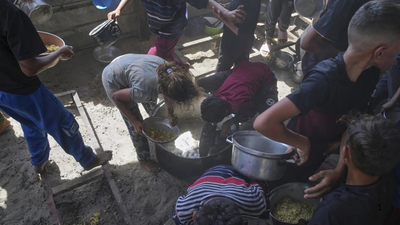
Gaza on edge of famine as Israel conflict escalates: UN report (Photo: AP)
Gaza is facing a "critical risk of famine," with the entire population experiencing a food crisis, according to a report released Monday by the Integrated Food Security Phase Classification (IPC), backed by the UN and various NGOs, after over two months of an Israeli aid blockade.The assessment reveals alarming statistics: approximately 22 percent of Gaza's 2.4 million residents are experiencing a humanitarian "catastrophe". The IPC report indicates that the complete population could encounter a food crisis "or worse" by September, following over two months of Israeli restrictions on aid.The organisation's findings demonstrate a significant decline in conditions since their previous evaluation in October 2024.
"The entire population is facing high levels of acute food insecurity, with half a million people, one in five facing starvation," it said. The report estimates that hundreds of thousands are enduring the most severe levels of hunger, with many households forced to rely on extreme coping strategies such as begging or collecting and selling garbage to afford a meal.
Humanitarian officials say previously distributed food stocks have run out of stock, and services like community kitchens and bakeries supported by the world food programme (WFP) have closed down due to a lack of supplies.
Key highlights of the report are:
- Critical risk of famine: Entire Gaza population (2.4 million) at risk; 22% (470,000 people) face catastrophic food insecurity (IPC Phase 5).
- Rapid deterioration: Conditions have worsened significantly since October 2024; 93% of the population (1.95 million) are now in crisis (IPC Phase 3) or worse.
- Prolonged aid blockade: All humanitarian and commercial aid has been blocked since early March, marking over 60 days with no access to essential supplies.
- Food and supply exhaustion: UN and WFP food stocks and bakery support were depleted by late April.
- Malnutrition surge: Projected 71,000 children under 5 and 17,000 mothers in urgent need of treatment.
- Aid at the border, unable to enter: Over 116,000 metric tons of food aid and critical nutrition supplies are waiting at crossings.
Despite a brief period of stability earlier this year during a temporary ceasefire, renewed military operations since March have deteriorated humanitarian progress. The continued blockade has not only stopped food from entering but has also prevented the distribution of medical supplies and clean water, pushing public health systems to the brink of collapse.“The food families need is sitting at the border, while people inside Gaza are starving,” said Cindy McCain, executive director of the WFP told AFP.
Both WFP and UNICEF have emphasized the urgency of reopening crossings and resuming aid delivery, warning that waiting until famine is officially declared will cost thousands of lives.UNICEF has highlighted the acute vulnerability of children, stating that malnutrition is accelerating in areas like Rafah and North Gaza. With healthcare access severely limited and clean water increasingly acute, agencies predict a surge in preventable deaths among children under five in the coming months.Aid organizations report that more than 116,000 metric tons of food, enough to sustain a million people for several months, is prepositioned just outside Gaza, ready for distribution. However, ongoing military operations and restrictions have halted their entry. Humanitarian partners say they are prepared to act immediately if access is granted, but emphasize that time is running out.Israel has denied that famine is occurring, citing the aid that entered during the previous ceasefire.
However, rights groups and UN agencies observed that the current blockade, now in effect for over two months, is unprecedented and potentially constitutes a war crime under international law.The IPC report warns that if current trends continue, the coming months could see significant spikes in hunger-related mortality, particularly among vulnerable groups like children and pregnant women. Agencies continue to call on all parties to allow safe and unimpeded humanitarian access, stressing that the consequences of inaction will be irreversible.

 3 hours ago
40
3 hours ago
40




























 English (US)
English (US)